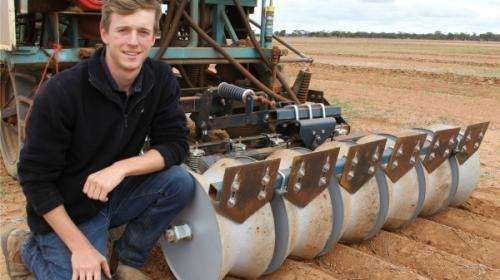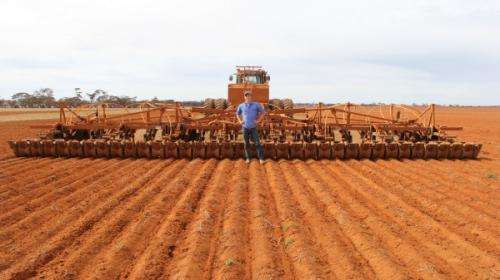Callum Wesley with the Wesley Wheel. Credit: DAFWA
Field tests indicate the WA-invented 'Wesley Wheel' can improve water conservation in farm fields.
The specially designed wheel is pulled behind a tractor in place of a conventional press wheel, compacting soil on the sides of furrows into a uniform vee-shape to increase water and nutrient harvesting.
Better compaction not only allows for greater flow into the trough but reduces soil surface area and sun exposure to lessen moisture evaporation.
The device's inventor is Callum Wesley, a third-generation Wheatbelt farmer and consultant with the Department of Agriculture and Food WA (DAFWA), who came up with the concept at the age of 16.
"I went away to boarding school for five years and in my holidays I would return to Southern Cross and see the continuation of prolonged drought and the heartache that it caused, and I knew in myself that I wasn't going to settle for that," Mr Wesley says.
On one of those breaks, he decided to test a 'simple concept' he'd come up with.
He designed a rough prototype of the Wesley Wheel and tested its effectiveness on a 40sqm plot of land on the family farm, which he planted with 80 kilos of seed and fertiliser and compared with a control plot.
The result was a yield equivalent to 4.5 tonnes of wheat per hectare, which he presented to a very interested DAFWA.
Callum Wesley with the Wesley Wheel. Credit: DAFWA
Fielding testing took place in Southern Cross and Merredin in 2014, with yield improvements of 25 per cent (compared to control) in row spacings of 460mm at Merredin—translating into an improvement of .26t per hectare.
Narrower row spacing didn't show any significant yield improvement, and no difference was found in comparison to conventional methods at Southern Cross, which researchers contribute to substantially below-average rain fall during the testing period.
"Many of the eastern district shires are not in a position to wait ten or fifteen years to get results out there," he says.
"That's one of the beauties of the concept...this is a management practice that you can get results from in 12 months.
"It's not that it doesn't rain enough, it's just that our efficiency is not adequate to maintain sustainability doing what we have done for the last 60 years."
Provided by Science Network WA

























